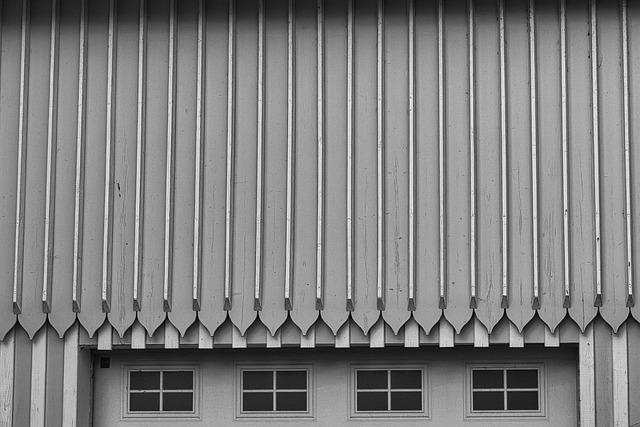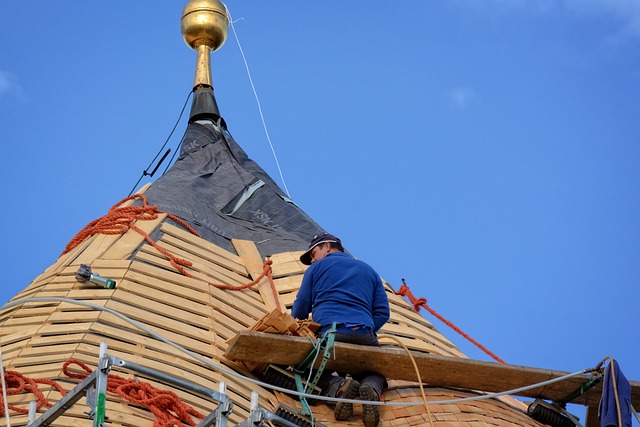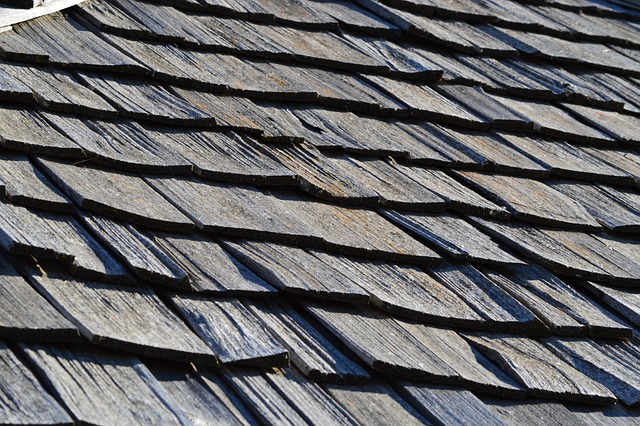Commercial roofing requires specialized knowledge due to its large-scale nature and diverse challenges. Understanding different roof types—from flat to steep-slope designs—is key in selecting the right contractors. Various materials, including affordable asphalt shingles, durable metal roofing, and efficient flat roof membranes, cater to diverse needs, budgets, climates, and styles. Commercial roofing contractors are vital for upholding structural integrity, visual appeal, and operational efficiency of commercial properties. They manage intricate systems, ensure robust installation, regular inspection, maintenance, and repairs, enhancing energy efficiency through strategic insulation and ventilation integration.
When choosing a contractor, prioritize experience in large-scale projects, proper licensing, insurance, warranties, clear communication about pricing, and transparency. Experts stay current with industry innovations, ensuring durable, aesthetically pleasing, and efficient roofing solutions. Safety at height and compliance with regulations are paramount, requiring specialized training and adherence to strict protocols for hazardous materials.
Technological advancements like drones, smart roofing systems, lightweight tiles, and digital tools like BIM are transforming the industry, driving safety, efficiency, sustainability, and informed decision-making. Case studies highlight successful transformations, emphasizing the importance of commercial roofing excellence in preserving architectural integrity and accommodating modern needs.
Commercial roofing is a complex yet vital aspect of any business, demanding expertise and precision. This comprehensive guide explores the intricacies of commercial roofing, from understanding diverse types and materials to navigating key industry trends. We delve into the crucial role played by professional contractors, offering insights on hiring, safety measures, and common challenges. Discover how technology advancements are revolutionizing this sector, backed by case studies showcasing successful projects. Get ready to ascend to new heights in commercial roofing knowledge!
Understanding Commercial Roofing: Types and Materials

Commercial roofing involves specialized knowledge and techniques due to the unique challenges presented by large-scale projects. Understanding the diverse types of commercial roofs is key to selecting the right contractors. These structures often incorporate flat or low-slope roofs, characterized by their simplicity in design and maintenance. Alternatively, steep-slope roofs are prevalent in older buildings and require skilled craftsmanship for proper installation and repair.
When it comes to materials, commercial roofing offers a wide array of options tailored to different needs. Common choices include asphalt shingles, known for their affordability and ease of installation. Metal roofing has gained popularity for its durability and longevity, while flat roof membranes provide an efficient solution for seamless coverage. Each material has distinct advantages, catering to various budgets, climates, and architectural styles, ensuring businesses find the perfect fit for their commercial roofing needs.
The Role of Commercial Roofing Contractors

Commercial roofing contractors play a vital role in maintaining and enhancing the structural integrity, aesthetics, and functionality of commercial buildings. They are experts in managing complex roofing systems that often cover large areas, featuring various materials like metal, asphalt, or flat roof membranes. These professionals ensure that these roofs are not just installed but also regularly inspected, maintained, and repaired to withstand harsh weather conditions.
Their expertise extends to ensuring the energy efficiency of commercial spaces through proper insulation and ventilation solutions integrated into roofing designs. By staying updated with industry innovations and safety standards, commercial roofing contractors contribute to creating sustainable, safe, and visually appealing environments for businesses to thrive.
Key Considerations When Hiring a Contractor

When hiring a commercial roofing contractor, several key considerations come into play to ensure a successful and durable roof installation or repair. One of the most important factors is experience and expertise in commercial roofing. Contractors should have a proven track record of handling projects similar to yours, demonstrating their proficiency in dealing with large-scale roofs and any unique challenges that may arise. This includes knowledge of various roofing materials specific to commercial properties, such as metal, flat roof systems, or energy-efficient options.
Another vital aspect is licensing, insurance, and warranties. Always verify that the contractor is properly licensed and insured to operate in your area, protecting both you and them from potential legal issues. Reputable contractors should also offer comprehensive warranties on their work, ensuring long-term peace of mind. Communication and a clear understanding of the project scope are essential too. Choose a contractor who is transparent about pricing, timelines, and any potential additional costs, ensuring you’re aware of all aspects before signing any contracts.
Expertise: What to Look for in a Professional

When selecting a commercial roofing contractor, expertise is key. Look for professionals who possess extensive experience in handling large-scale commercial roofing projects, as this ensures they understand the unique challenges and requirements such work demands. They should be well-versed in various roofing types, materials, and installation techniques specific to commercial buildings.
Check their portfolio to assess the quality of their past work and gain insights into their problem-solving abilities. Expert contractors should also stay updated with industry innovations, ensuring your roof is installed or repaired using modern, efficient methods. This expertise translates to a more durable, aesthetically pleasing, and energy-efficient roof for your commercial property.
Safety Measures and Regulations in Commercial Roofing

In the realm of commercial roofing, safety is paramount due to the elevated heights and complex nature of the work. Contractors are mandated to adhere to stringent regulations designed to safeguard both workers and the general public. This includes comprehensive training in fall protection, such as utilizing guardrails, safety harnesses, and tether systems, especially when working on flat or low-sloped roofs. Regular inspections and maintenance of roofing equipment, ladders, and scaffolds are crucial to prevent accidents and ensure compliance with occupational health and safety standards.
Additionally, commercial roofing projects often involve hazardous materials like asbestos or lead-based paint, necessitating specific handling and disposal protocols. Contractors must be proficient in identifying these substances, employing appropriate protective gear, and following environmental regulations to mitigate risks for their team and the surrounding community. Staying abreast of evolving industry standards and local building codes is essential for commercial roofing contractors to maintain a safe working environment and deliver high-quality projects.
Common Challenges Faced by Contractors

Commercial roofing contractors often face a unique set of challenges that differ from residential roofing projects. One significant hurdle is managing large-scale projects, which require meticulous planning and coordination. These endeavors involve intricate designs, complex structures, and diverse materials, demanding precision and adherence to safety standards. Skilled contractors must efficiently navigate through these complexities while ensuring timely completion and client satisfaction.
Another common challenge lies in the ever-evolving industry regulations and building codes. Commercial roofing often involves adhering to stringent local ordinances, particularly in urban areas with dense populations. Contractors must stay updated on changes in safety protocols, material specifications, and environmental standards, requiring continuous learning and adaptation. Efficient project management, combined with a deep understanding of these regulatory frameworks, is crucial for successful commercial roofing endeavors.
Technology Advancements in the Industry

The commercial roofing industry has witnessed significant technological advancements, revolutionizing how contractors approach and execute roofing projects. Modern tools and techniques have improved efficiency, safety, and the overall quality of commercial roofing installations. One notable advancement is the integration of drones in roof inspections, providing aerial views that help identify leaks, damage, or areas requiring repair more accurately and swiftly.
Additionally, innovative materials like lightweight, high-durability tiles and metal panels have emerged, offering superior wind resistance and extended lifespans. These advancements not only enhance structural integrity but also reduce maintenance costs for businesses. Advanced roofing systems now incorporate smart technology, featuring sensors that monitor weather conditions, detect leaks early, and optimize energy efficiency through optimized ventilation and insulation.
Case Studies: Successful Commercial Roofing Projects

Commercial roofing projects require meticulous planning and execution, especially in diverse environments such as skyscrapers, warehouses, or retail spaces. Case studies offer a window into the successful transformation of these structures, showcasing the expertise of commercial roofing contractors. For instance, a recent project involved a historic city centre building that needed a complete roof replacement while preserving its architectural integrity. The contractor utilized cutting-edge materials and techniques, including energy-efficient membranes and sophisticated flashing systems, to ensure water tightness and structural stability without compromising the building’s aesthetic appeal.
Another notable case highlights a state-of-the-art technology hub where a complex design challenge was met with innovative solutions. The project demanded a roof system that could accommodate extensive solar panel installations while maintaining optimal ventilation for server rooms. By employing custom-engineered metal panels and advanced cooling technologies, the roofing contractor created a seamless, integrated system enhancing both functionality and aesthetics. These successful projects not only demonstrate the technical prowess of commercial roofing specialists but also their commitment to delivering superior results tailored to each unique challenge.
Future Trends Shaping the Commercial Roofing Sector

The commercial roofing sector is constantly evolving, driven by technological advancements and shifting market demands. One prominent trend is the increasing adoption of sustainable materials and practices. As environmental consciousness grows, commercial roofing contractors are incorporating eco-friendly options like cool roofs, which reflect sunlight and reduce energy consumption, and recycled content roofing products. These innovations not only contribute to a greener planet but also offer long-term cost savings for businesses.
Additionally, digital transformation is reshaping how commercial roofing projects are managed. Building Information Modeling (BIM) is becoming standard, allowing for more precise planning, better collaboration between stakeholders, and enhanced project visibility. Moreover, advanced drone technology is revolutionizing site inspections and progress monitoring, providing contractors with real-time data for informed decision-making. These future trends promise to make commercial roofing safer, more efficient, and more sustainable.
